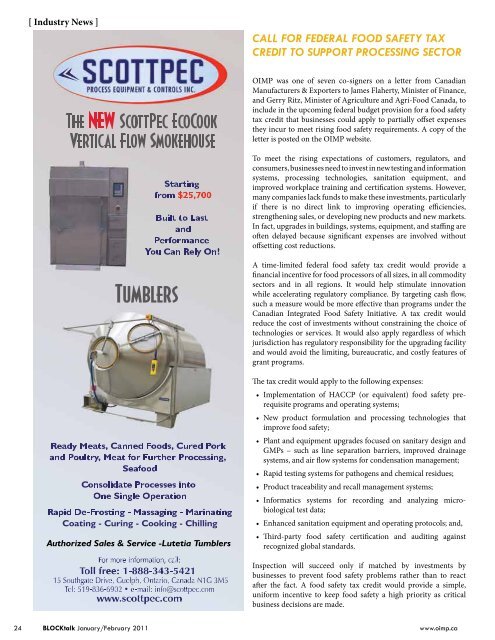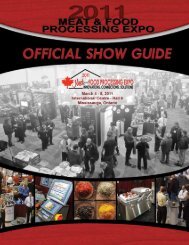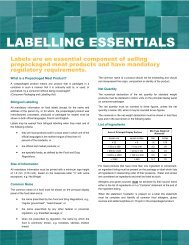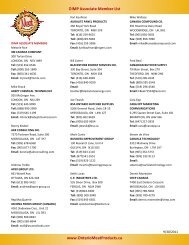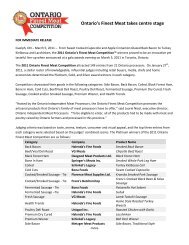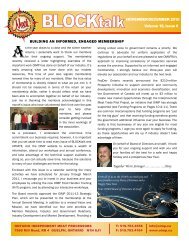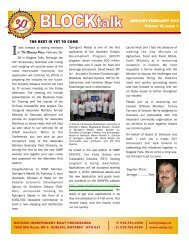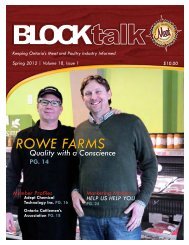record breaking numbers - Ontario Independent Meat Processors
record breaking numbers - Ontario Independent Meat Processors
record breaking numbers - Ontario Independent Meat Processors
Create successful ePaper yourself
Turn your PDF publications into a flip-book with our unique Google optimized e-Paper software.
[ Industry News ]<br />
The new ScottPec EcoCook<br />
Vertical Flow Smokehouse<br />
Ready <strong>Meat</strong>s, Canned Foods, Cured Pork<br />
and Poultry, <strong>Meat</strong> for Further Processing,<br />
Seafood<br />
Consolidate Processes into<br />
One Single Operation<br />
Rapid De-Frosting - Massaging - Marinating<br />
Coating - Curing - Cooking - Chilling<br />
Authorized Sales & Service -Lutetia Tumblers<br />
For more information, call:<br />
Toll free: 1-888-343-5421<br />
15 Southgate Drive, Guelph, <strong>Ontario</strong>, Canada N1G 3M5<br />
Tel: 519-836-6902 • e-mail: info@scottpec.com<br />
www.scottpec.com<br />
24 BLOCKtalk January/February 2011<br />
Starting<br />
from $25,700<br />
Built to Last<br />
and<br />
Performance<br />
You Can Rely On!<br />
Tumblers<br />
CALL FOR FEDERAL FOOD SAFETY TAX<br />
CREDIT TO SUPPORT PROCESSING SECTOR<br />
OIMP was one of seven co-signers on a letter from Canadian<br />
Manufacturers & Exporters to James Flaherty, Minister of Finance,<br />
and Gerry Ritz, Minister of Agriculture and Agri-Food Canada, to<br />
include in the upcoming federal budget provision for a food safety<br />
tax credit that businesses could apply to partially offset expenses<br />
they incur to meet rising food safety requirements. A copy of the<br />
letter is posted on the OIMP website.<br />
To meet the rising expectations of customers, regulators, and<br />
consumers, businesses need to invest in new testing and information<br />
systems, processing technologies, sanitation equipment, and<br />
improved workplace training and certification systems. However,<br />
many companies lack funds to make these investments, particularly<br />
if there is no direct link to improving operating efficiencies,<br />
strengthening sales, or developing new products and new markets.<br />
In fact, upgrades in buildings, systems, equipment, and staffing are<br />
often delayed because significant expenses are involved without<br />
offsetting cost reductions.<br />
A time-limited federal food safety tax credit would provide a<br />
financial incentive for food processors of all sizes, in all commodity<br />
sectors and in all regions. It would help stimulate innovation<br />
while accelerating regulatory compliance. By targeting cash flow,<br />
such a measure would be more effective than programs under the<br />
Canadian Integrated Food Safety Initiative. A tax credit would<br />
reduce the cost of investments without constraining the choice of<br />
technologies or services. It would also apply regardless of which<br />
jurisdiction has regulatory responsibility for the upgrading facility<br />
and would avoid the limiting, bureaucratic, and costly features of<br />
grant programs.<br />
The tax credit would apply to the following expenses:<br />
• Implementation of HACCP (or equivalent) food safety prerequisite<br />
programs and operating systems;<br />
• New product formulation and processing technologies that<br />
improve food safety;<br />
• Plant and equipment upgrades focused on sanitary design and<br />
GMPs – such as line separation barriers, improved drainage<br />
systems, and air flow systems for condensation management;<br />
• Rapid testing systems for pathogens and chemical residues;<br />
• Product traceability and recall management systems;<br />
• Informatics systems for <strong>record</strong>ing and analyzing microbiological<br />
test data;<br />
• Enhanced sanitation equipment and operating protocols; and,<br />
• Third-party food safety certification and auditing against<br />
recognized global standards.<br />
Inspection will succeed only if matched by investments by<br />
businesses to prevent food safety problems rather than to react<br />
after the fact. A food safety tax credit would provide a simple,<br />
uniform incentive to keep food safety a high priority as critical<br />
business decisions are made.<br />
www.oimp.ca


